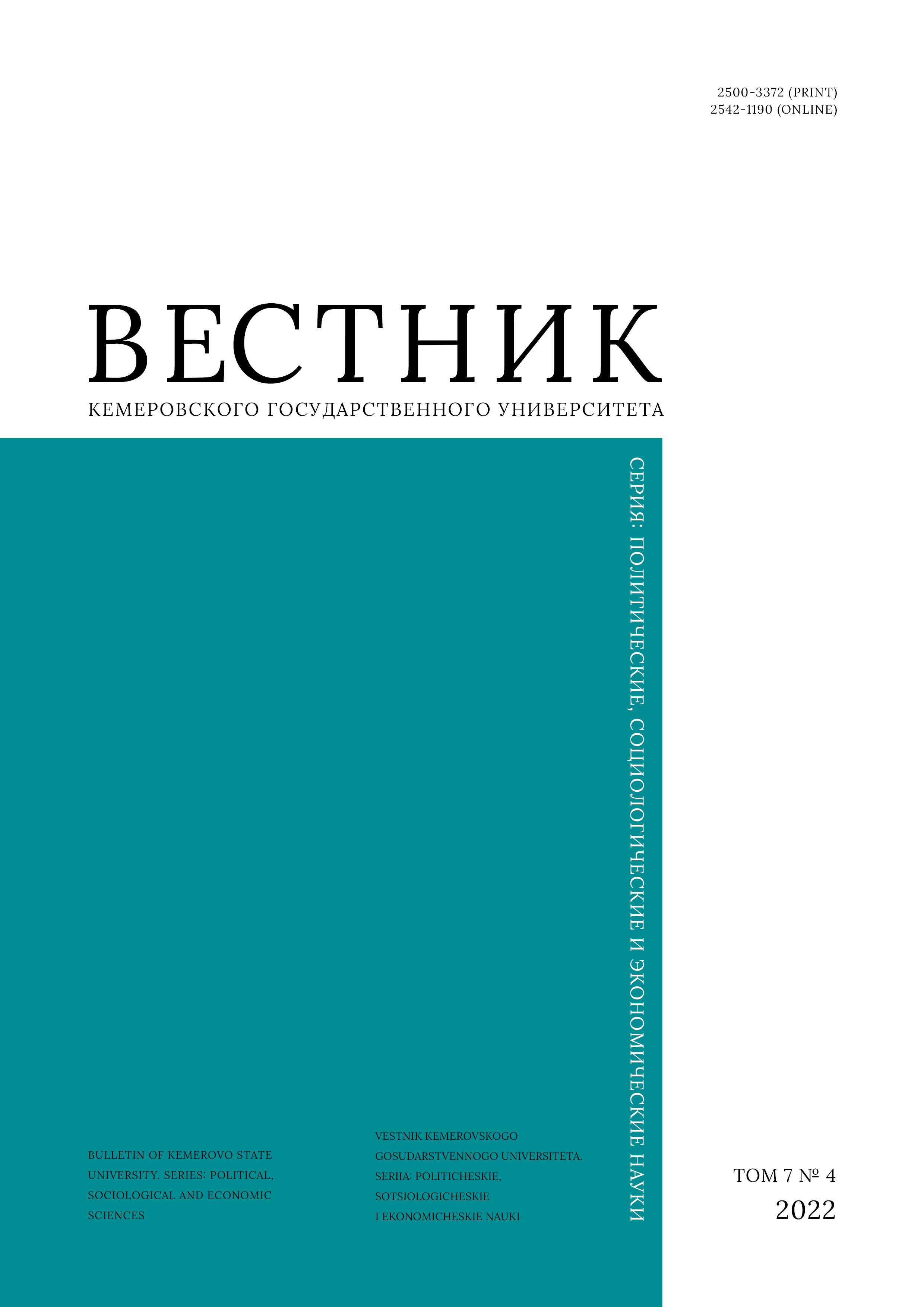Perm', Russian Federation
Social networks are an essential part of various political processes. They help to build mental models and control official public discourse. The article features the ethnic resource as part of the regional identity constructed by the President of the Republic of Tatarstan on his Instagram. The analysis relied on both the subjective and regional presentation, as well as visual and content contexts. The author analyzed Instagram posts published in 2020-2022, as well as media publications on the issue of ethno-cultural positioning. The analysis included qualitative and quantitative content analyses, as well as static and comparative methods. Rustam Minnikhanov’s Instagram proved to be an informative source that made it possible to identify the priority attitudes to the local ethno-cultural issues in the official discourse. The ethno-cultural resource was especially important for the personal self-presentation. The regional positioning maintained a multi-ethnic Tatarstan identity, where the ethnic resource played an important role, which does not mean the real parity of the corresponding ethno-cultural traditions. The author believes that the ethno-cultural resource will continue to determine the socio-political climate in the region.
ethnic identity, institutionalization, identity politics, polyethnic region, social networks, Instagram, R. Minnikhanov
1. Van Dijk T. A. Discourse and power. Moscow: LIBROKOM, 2013, 344. (In Russ.)
2. Blakkisrud H. Medvedev's new governors. Europe-Asia Studies, 2011, 63(3): 367-395. https://doi.org/10.1080/09668136.2011.557531
3. Sharafutdinova G. Gestalt switch in Russian federalism: the decline in regional power under Putin. Comparative Politics, 2013, 45(3): 357-376. https://doi.org/10.5129/001041512X13815255435013
4. Orttung R. Center-periphery relations. Russia in 2020: scenarios for the future, eds. Lipman M., Petrov N. Washington: Carnegie Endowment for International Peace, 2011, 329-348. https://doi.org/10.2307/j.ctt6wpj1s.21
5. Hartley J. M. Non-Russians on the Volga: autonomy and identity. The Volga: A history of Russia’s greatest river. Yale University Press, 2021, 286-305. https://doi.org/10.2307/j.ctv1b0fw6v.25
6. Keenan R. Tatarstan: the battle over Islam in Russia’s heartland. World Policy Journal, 2013, 30(2): 70-79. https://doi.org/10.1177/0740277513494068
7. Bassin M. The patron of the Turkic peoples. The Gumilev Mystique: Biopolitics, Eurasianism, and the Construction of Community in Modern Russia. Cornell University Press, 2016, 273-305. https://doi.org/10.7591/9781501703393-013
8. Braun A., Wingender M. Kazakhstan and Tatarstan - building identities in Russian-Turkic speech communities. Kazakh in Post-Soviet Kazakhstan: Proc. Internat. Symposium on Kazakh, 30 Nov - 2 Dec 2011, ed. Muhamedowa R. Wiesbaden: Harrassowitz Verlag, 2015, 69-94. https://doi.org/10.2307/j.ctvc2rkbb.8
9. Renz B., Sullivan J. Electronic resources and the study of political elites in Russia. Europe-Asia Studies, 2013, 65(10): 1898-1911. https://doi.org/10.1080/09668136.2013.848646
10. Renz B., Sullivan J. Making a connection in the provinces? Russia's tweeting governors. East European Politics, 2013, 29(2): 135-151. https://doi.org/10.1080/21599165.2013.779258
11. Akhmetshina I. F., Akhmetshina E. G. The culture of political communication in social networks in the Republic of Tatarstan. Revista San Gregorio, 2017, (20): 162-169.
12. Ilikova L. E. Intercultural dialogue and interconfessional consent as a basic value in the official government discourse of the Republic of Tatarstan. Journal of Russian Studies, 2020, 1(1): 7-17. (In Russ.) EDN: https://elibrary.ru/ZDKMQN
13. Ilikova L. E. Representation of the image of interfaith harmony in the official discourse of the authorities in the Republic of Tatarstan. Positive experience in regulating ethno-social and ethno-cultural processes in the regions of the Russian Federation: Proc. III All-Rus. Sci.-Prac. Conf., Kazan, 6-7 Sep 2018. Kazan: Sh. Marjani Institute of History, 2018, 41-46. (In Russ.) EDN: https://elibrary.ru/YLUNYD
14. Gabdrakhmanova G. F. Discursive identity construction in messages to the regional parliament. Case of the Republic of Tatarstan. Polis. Political Studies, 2021, (5): 146-160. (In Russ.) https://doi.org/10.17976/jpps/2021.05.10
15. Ivanova T. K., Arzhantseva N. V., Shigin L. B. Blogs of civil servants of the Republic on the Internet web-sites. Journal of Russian Studies, 2021, 2(4): 52-64. (In Russ.) EDN: https://elibrary.ru/FHHOAD
16. Drobizheva L. M., Ryzhova S. V., Titova T. A. Russian, Republican, ethnic identity in Tatarstan. Positive interethnic relations and prevention of intolerance: Tatarstan's experience in the All-Russian context, eds. Drobizheva L. M., Ryzhova S. V. St. Petersburg: Nestor-Istoriia, 2016, 33-41. (In Russ.) EDN: https://elibrary.ru/YIICJX
17. Sagitova L. V. Identity politics and its actors. Kazan: Sh. Marjani Institute of History, 2018, 359. (In Russ.) EDN: https://elibrary.ru/OXMFSH
18. Sagitova L. V. Dynamics of the ethnic factor in the identity policy of modern Tatarstan. Vestnik rossiiskoi natsii, 2018, (4): 59-70. (In Russ.) EDN: https://elibrary.ru/YPCZZR
19. Yamalneev I. M. Ethnoregional identity as a political project in the Republic of Tatarstan. Cand. Pol. Sci. Diss. Kazan, 2005, 190. (In Russ.)
20. Ilyina O. V., Kablukov E. V. Practices of constructing regional identity in the media discourse of Tatarstan. Nauchnyi dialog, 2020, (3): 52-66. (In Russ.) https://doi.org/10.24224/2227-1295-2020-3-52-66
21. Psyanchin A. V., Migranova E. V., Zaripov A. Ya. The issue of ethnic and all-Russian identity in the Republics of Bashkortostan and Tatarstan revisited. Oriental Studies, 2021, 14(4): 743-757. (In Russ.) https://doi.org/10.22162/2619-0990-2021-56-4-743-757
22. Makarova G. I. Ethnocultural policies of the federal center and regions of Russia (on the example of the Republic of Tatarstan): identity formation strategies. Etnosotsium and international culture, 2009, (2): 195-203. (In Russ.)
23. Castells M. The formation of a society of network structures. A new post-industrial wave in the West, ed. Inozemtsev V. L. Moscow: Academia, 1999, 492-505. (In Russ.)
24. Berger P. L., Luckmann T. The social construction of reality. A treatise on sociology of knowledge. Moscow: Medium, 1995, 323. (In Russ.)

















